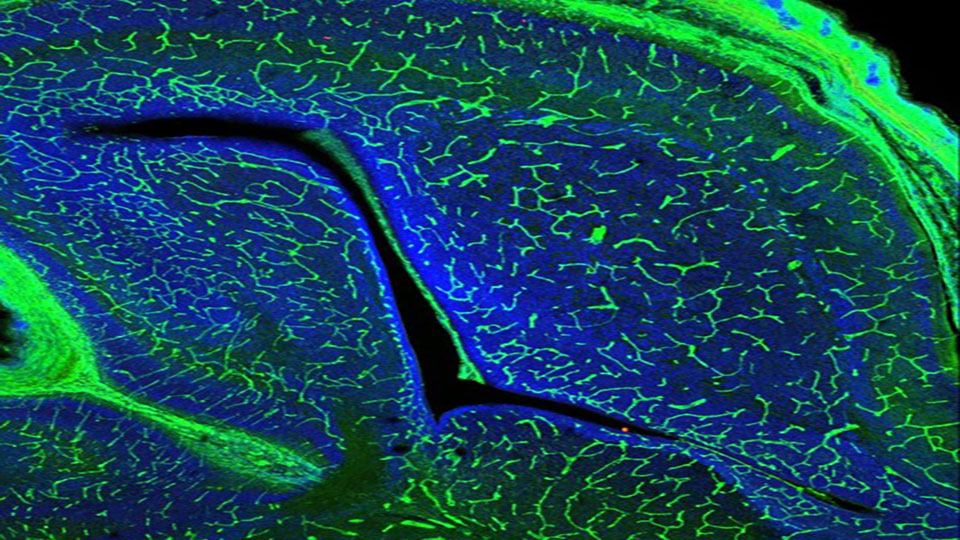Little-known protein choline transporter in brain may be key therapeutic target for ageing and Alzheimer’s disease
Published: 06 May 2024

Mfsd7c protein (green microcapillaries) in the blood brain barrier
Researchers from the Yong Loo Lin School of Medicine at the National University of Singapore (NUS Medicine) have unexpectedly discovered the novel functions of the orphan transporter called Mfsd7c as a facilitative transporter of choline at the blood-brain barrier (BBB), which could pave the way for novel therapeutic interventions in Alzheimer’s disease and other neurological disorders.
Contrary to conventional wisdom that the brain imports free choline from the bloodstream, the study revealed that Mfsd7c is essential for exporting excessive choline out of the brain. This unexpected finding challenges the previously established theories of choline metabolism in the brain and opens new avenues for understanding neurological diseases.
To discover this new biology, the team injected a compound called lysophosphatidylcholine (LPC) into the pre-clinical models. The LPC enters the brain and releases choline that allow researchers to trace the source of choline from the blood. They found that the labelled choline, derived from blood LPC, accumulated in the brain of pre-clinical models where the Mfsd7c protein was inhibited. The brain lipid profile was unchanged throughout. This finding indicated that the excessive amount of choline from LPC has been exported out of the brain via the Mfsd7c protein at the blood-brain barrier.
Interestingly, the study also demonstrated that targeting the Mfsd7c protein in pre-clinical models increases brain choline and acetylcholine levels. Targeting the Mfsd7c protein would also provide a much-needed boost in choline and acetylcholine levels in senior citizens and patients with Alzheimer’s disease who have shown declined levels of acetylcholine in the brain. Choline is the precursor for the synthesis of acetylcholine which plays an important role in regaining memory, learning and muscle control which could provide further insights into creating newer therapeutics for patients with Alzheimer’s disease.
The human brain contains approximately two-thirds of its weight in lipids. Lipids that contain choline is key for brain development and function. Choline is especially needed by the brain and nervous system to regulate memory, moods and muscle control as well.

[From left to right] The research team consists of Dr Nguyen Nam Long, Dr Nguyen Thi Anh Xuan, Ms Ha Thi Thuy Hoa and Ms Leong Nancy.
The research team is now focused on leveraging their discovery to develop drugs targeting Mfsd7c in the brain, with the ultimate goal of translating their findings into tangible therapeutic interventions for neurological disorders.
This groundbreaking study represents a significant step forward in our understanding of brain metabolism and offers hope for the development of effective treatments for Alzheimer’s disease and related conditions.
The study, titled ‘MFSD7c functions as a transporter of choline at the blood-brain barrier’ was published in Cell Research on 2 February 2024.
Read the media release here.


